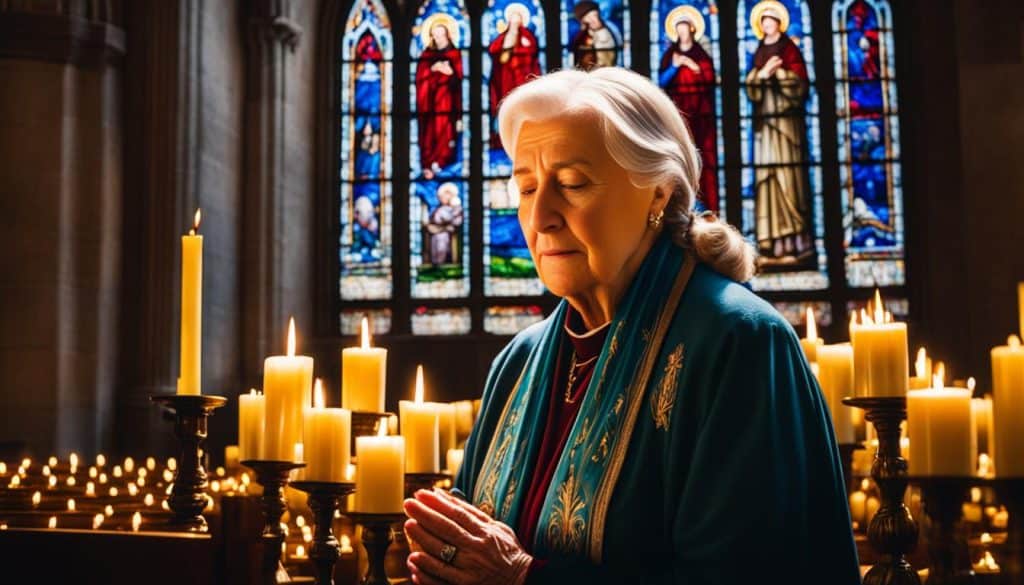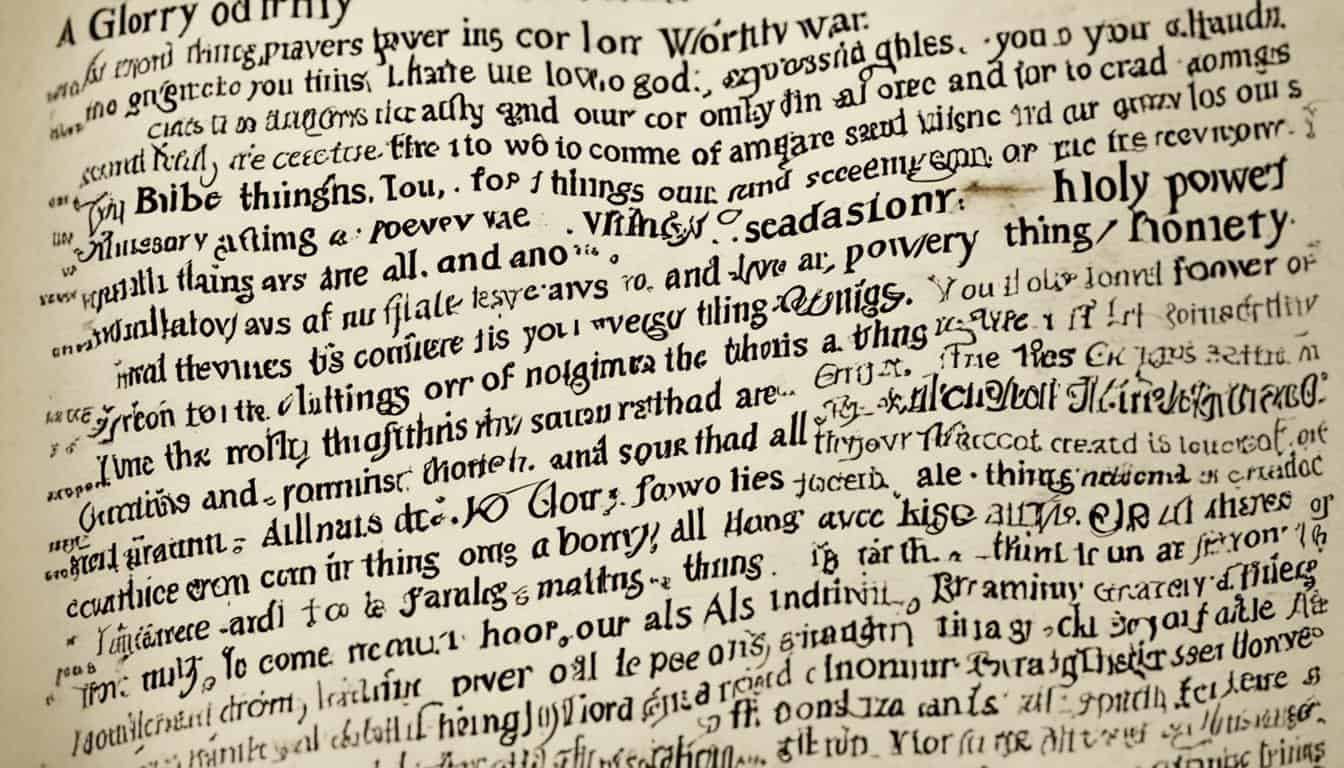When we think of prayers, we often associate them with requests and petitions. But did you know that the Bible is filled with beautiful examples of adoration prayers?
These prayers express deep reverence and worship towards God, evoking a sense of awe and gratitude.
In this article, we will explore 10 examples of adoration prayers in the Bible that highlight the beauty of divine communication.
From well-known figures like King David to lesser-known characters like Hannah and Jabez, these prayers offer a glimpse into the heartfelt expressions of adoration found in Scripture.
Are you ready to discover the power and beauty of adoration prayers in the Bible?
Hannah’s Prayer of Dedication
In the book of 1 Samuel, amidst the tales of kings and prophets, lies a powerful prayer of adoration and dedication offered by Hannah. Though not as well-known as other biblical figures, her prayer in 1 Samuel 2:1-10 showcases her genuine reverence and worship for the Lord.
Hannah’s prayer of dedication is a heartfelt expression of gratitude and surrender as she dedicated her beloved son, Samuel, to serve in the Lord’s house. It is a beautiful example of a mother’s devotion and faithfulness.
“My heart rejoices in the Lord;
in the Lord my horn is lifted high.
My mouth boasts over my enemies,
for I delight in your deliverance.
There is no one holy like the Lord;
there is no one besides you;
there is no Rock like our God.
Do not keep talking so proudly
or let your mouth speak such arrogance,
for the Lord is a God who knows,
and by him deeds are weighed.”
Hannah’s prayer is filled with gratitude and adoration, recognizing God’s greatness and sovereignty. She acknowledges that there is no one holy like the Lord and no one as powerful as Him. She humbly expresses her trust and reliance on God’s wisdom and acknowledges His righteous judgment.
Through her prayer, Hannah exemplifies the power of surrendering one’s desires and dreams to God. It serves as a reminder to trust in His plans and to offer our deepest adoration and worship even in the midst of challenging circumstances.
| Key Themes | Key Scriptures |
|---|---|
| Gratitude | 1 Samuel 2:1-3 |
| Surrender | 1 Samuel 1:10-11 |
| Trust | 1 Samuel 1:19-20 |
Hannah’s prayer not only serves as a model of dedication and surrender but also as a testament to the faithfulness of God. It is an inspiring example for believers today to pour out their hearts to God with sincerity and trust, knowing that He hears and answers prayers.
Jabez’s Prayer for Blessings
In the book of 1 Chronicles 4:10, we encounter a brief yet powerful prayer known as Jabez’s Prayer. This prayer of adoration and request has captivated the hearts of many believers throughout history.
“Oh, that you would bless me indeed, and enlarge my territory, that Your hand would be with me, and that You would keep me from evil, that I may not cause pain!”
These heartfelt words uttered by Jabez reflect his deep desire for God’s favor and protection. In his prayer, Jabez acknowledges his complete dependence on God’s guidance and provision, demonstrating a humble and sincere faith.
Jabez’s plea for blessings is not driven by selfish ambition but rather a genuine longing for God’s presence and deliverance. He seeks not only personal prosperity but also divine mercy to shield him from harm and prevent causing pain to others.
This prayer resonates with many today, as it reveals the profound connection between adoration, trust, and the desire for God’s intervention in our lives. Jabez’s humility and faith serve as a reminder that we can approach God with boldness, knowing that He listens to the cries of our hearts.
Jabez’s Prayer Explained
The specific requests in Jabez’s prayer hold significant meaning:
- “Oh, that you would bless me indeed”: Jabez humbly asks for an outpouring of God’s blessings in every aspect of his life, recognizing that true fulfillment comes from God alone.
- “Enlarge my territory”: This request goes beyond physical land or possessions. It represents Jabez’s desire for spiritual growth, influence, and impact, as he longs to make a difference in the lives of others.
- “Your hand would be with me”: Jabez seeks the continuous presence and guidance of God in his life, acknowledging the need for divine help and protection.
- “Keep me from evil”: Jabez appeals to God’s power to shield him from harmful influences and to help him walk in righteousness.
- “That I may not cause pain”: Jabez’s final plea reflects his commitment to living a life that brings joy and avoids causing harm or suffering to others.
Jabez’s Prayer is a beautiful example of how adoration and requests can be intertwined in our communication with God. It demonstrates the depth of Jabez’s faith and his willingness to surrender his life completely to God’s leading.

David’s Prayer of Praise and Gratitude
In 2 Samuel 7:18-29, King David poured out his heart in a prayer of adoration and gratitude to God. This heartfelt prayer was a response to the promises that God had made to David and his descendants.
In his prayer, David acknowledged God’s greatness and faithfulness, expressing his deep reverence and thanksgiving.
David’s prayer is a beautiful example of how we can approach God with adoration and thanksgiving, recognizing His power and goodness. Let’s dive deeper into David’s prayer and explore the key elements that make it a powerful expression of praise.
The Elements of David’s Prayer
1. Humility: David starts his prayer with humility, acknowledging his unworthiness in the presence of God. He recognizes that God has elevated him and his house, despite their humble origins.
“Who am I, Sovereign Lord, and what is my family, that you have brought me this far?” (2 Samuel 7:18)
2. Gratitude: Throughout the prayer, David repeatedly expresses his gratitude to God for His blessings and promises. He acknowledges God’s faithfulness in fulfilling His word.
“How great you are, Sovereign Lord! There is no one like you, and there is no God but you, as we have heard with our own ears.” (2 Samuel 7:22)
3. Reverence: David’s prayer is filled with reverence for God’s greatness and holiness. He acknowledges God’s sovereignty and exalts His name.
“So now, Lord God, may the promise you have made concerning your servant and his house be established forever. Do as you promised, so that your name will be great forever.” (2 Samuel 7:25-26)
4. Trust and Surrender: David demonstrates his trust in God’s plans and surrenders to His will. He acknowledges that everything comes from God and that His purposes are trustworthy.
“Now, Lord God, confirm the promise you have made concerning your servant and his house. Do as you promised, so that it will be established and that your name will be great forever. Then people will say, ‘The Lord Almighty, the God over Israel, is Israel’s God!’ And the house of your servant David will be established in your sight.” (2 Samuel 7:25-26)
David’s prayer serves as an example for us to approach God with adoration, gratitude, and surrender. It reminds us of the importance of acknowledging God’s faithfulness, humbling ourselves before Him, and entrusting our lives to His plans.
Hezekiah’s Prayer for Deliverance
In 2 Kings 19:15-19, we witness a powerful example of adoration and praise in King Hezekiah’s prayer as he sought God’s intervention against the formidable Assyrian army. Facing imminent danger and destruction, Hezekiah turned to the Lord with unwavering faith and humble reverence.
Hezekiah’s prayer can be divided into three significant components:
The Recognition of God’s Sovereignty
“O Lord, the God of Israel, enthroned above the cherubim, you are the God, you alone, of all the kingdoms of the earth; you have made heaven and earth.”
In the face of adversity, Hezekiah acknowledged God’s supremacy and dominion over all creation. He understood that only God had the power to deliver his people from the grasp of the Assyrian army.
Petition for Deliverance and Salvation
“Incline your ear, O Lord, and hear; open your eyes, O Lord, and see; and hear the words of Sennacherib, which he has sent to mock the living God. Truly, O Lord, the kings of Assyria have laid waste to the nations and their lands, and have cast their gods into the fire. But you, O Lord our God, save us from his hand, that all the kingdoms of the earth may know that you, O Lord, are God alone.”
Hezekiah earnestly implored God to listen and observe the malicious words spoken against Him and His people. He pleaded for deliverance, not solely for their sake, but also so that the nations may witness and recognize the unrivaled power and presence of God.
Confidence in God’s Promises
“Now, O Lord our God, save us, please, from his hand, that all the kingdoms of the earth may know that you, O Lord, are God alone.”
Hezekiah expressed unwavering trust in God’s promises and unlimited strength. He believed that God’s intervention would not just be a triumph for the people of Judah but a testimony to His unmatched sovereignty over all kingdoms.
Through his prayer, Hezekiah demonstrated the essence of adoration and praise – acknowledging God’s greatness, seeking His deliverance, and placing unwavering trust in His promises.
This remarkable act of faith led to a miraculous victory as God thwarted the Assyrian threat, preserving His people and displaying His power to the world.

Solomon’s Dedication Prayer for the Temple
In 1 Kings 8:22-61, Solomon, renowned for his wisdom, humbly and reverently dedicated the newly built temple to the Lord. This monumental event marked a significant milestone in Israel’s history and showcased Solomon’s deep adoration and commitment to God.

The dedication prayer delivered by Solomon was a heartfelt expression of gratitude, praise, and supplication. This prayer perfectly embodied the spirit of adoration, acknowledging God’s faithfulness, power, and sovereignty over His people.
“Lord, the God of Israel, there is no God like you in heaven above or on earth below. You keep your covenant of love with your servants who continue wholeheartedly in your way.”
“Yet, will God really dwell on earth? The heavens, even the highest heaven, cannot contain you. How much less this temple I have built!”
“But may your eyes be open to the plea of your servant and to the plea of your people Israel, and may you hear them whenever they call to you.”
Through his eloquent words, Solomon acknowledged that no earthly dwelling could truly contain the greatness of God. He recognized the Lord’s incomparable power and acknowledged the privilege of the people to commune with Him.
The dedication prayer of Solomon embodied adoration, humility, and a deep desire for God’s favor, blessing, and guidance. It served as a profound testament to the faith and devotion of Solomon and the Israelites, uniting them in worship and commitment to their Creator.
Key Elements of Solomon’s Dedication Prayer:
- Recognition of God’s unmatched greatness and covenant love
- Acknowledgment of the temple’s limited capacity to contain God’s glory
- Petition for God’s attentive ear and responsiveness to His people’s prayers
| Key Themes in Solomon’s Dedication Prayer | Scripture Reference |
|---|---|
| God’s incomparable greatness and covenant love | 1 Kings 8:23 |
| The limitations of the temple in containing God | 1 Kings 8:27 |
| Entreaty for God’s attentive ear to hear and answer prayers | 1 Kings 8:30 |
Solomon’s dedication prayer for the temple stands as a timeless example of adoration, humility, and heartfelt devotion. It serves as an invitation to all believers to approach God with reverence and awe, recognizing His unmatched greatness and steadfast love for His people.
Daniel’s Prayer of Thanksgiving
In the book of Daniel, we witness a remarkable prayer of thanksgiving offered by Daniel in response to God’s revelation of King Nebuchadnezzar’s dream. This prayer, found in Daniel 2:20-23, is a beautiful example of heartfelt adoration and gratitude towards God.
As a young captive in Babylon, Daniel found himself facing immense challenges and uncertainty. However, when God revealed the dream and its interpretation to Daniel, he responded with deep appreciation and worship. In his prayer, Daniel exclaims:
“Blessed be the name of God forever and ever, to whom belong wisdom and might. He changes times and seasons; he removes kings and sets up kings; he gives wisdom to the wise and knowledge to those who have understanding; he reveals deep and hidden things; he knows what is in the darkness, and the light dwells with him.” (Daniel 2:20-22)
These profound words reflect Daniel’s recognition of God’s sovereignty, wisdom, and power. He acknowledges that it is God alone who controls the course of history, revealing hidden truths and guiding the destinies of kings and nations.
In his prayer, Daniel further expresses gratitude and humility, recognizing that his own wisdom and understanding come from God. He continues:
“I thank you and praise you, O God of my fathers, for you have given me wisdom and might, and have now made known to me what we asked of you, for you have made known to us the king’s matter.” (Daniel 2:23)
These words reveal Daniel’s deep sense of gratitude for God’s faithfulness and favor. He recognizes that it is God who has granted him wisdom and understanding, making it possible for him to interpret the dream that troubled King Nebuchadnezzar.
Daniel’s prayer of thanksgiving serves as an inspiring example for believers today. It reminds us to acknowledge God’s sovereignty, wisdom, and provision in our lives. Just as Daniel praised and thanked God for His revelation and guidance, we too can express our gratitude for His faithfulness and blessings.

Let us take a moment to reflect on the depth of Daniel’s prayer and consider how we can incorporate adoration and thanksgiving into our own prayer lives. By recognizing God’s sovereignty and expressing heartfelt gratitude, we can deepen our relationship with Him and experience the joy of His presence.
| Key Points in Daniel’s Prayer of Thanksgiving (Daniel 2:20-23) |
|---|
| Blesses the name of God |
| Acknowledges God’s wisdom and might |
| Recognizes God’s control over times and seasons |
| Expresses gratitude for God’s revelation and understanding |
Ezra’s Prayer for God’s Favor and Guidance
Continuing our exploration of adoration prayers in the Bible, we come to Ezra’s Prayer for God’s Favor and Guidance. In the book of Ezra, we find a powerful example of a scribe and priest expressing adoration and thanksgiving to God.
“Blessed be the Lord, the God of our fathers, who put such a thing as this into the heart of the king, to beautify the house of the Lord that is in Jerusalem, and who extended to me his steadfast love before the king and his counselors, and before all the king’s mighty officers. I took courage, for the hand of the Lord my God was on me, and I gathered leading men from Israel to go up with me.” – Ezra 7:27-28
Ezra’s prayer is centered around gratitude for God’s favor and guidance in leading the exiles back to Jerusalem and in the restoration of the temple. It is a reflection of his deep reverence and trust in God’s providence.
Through his prayer, Ezra acknowledges the Lord’s sovereignty and recognizes that it is God who has stirred the heart of the king to support the rebuilding of the temple. He also acknowledges God’s steadfast love and protection, which gave him the courage to gather the people and embark on this significant journey.
Ezra’s prayer serves as an inspirational example of how adoration and thanksgiving can be intertwined with expressions of trust and reliance on God. It reminds us to acknowledge His hand in every aspect of our lives and to cultivate a heart of gratitude for His faithfulness.
Comparing Adoration Prayers in the Bible
| Character | Biblical Reference |
|---|---|
| Hannah | 1 Samuel 2:1-10 |
| Jabez | 1 Chronicles 4:10 |
| David | 2 Samuel 7:18-29 |
| Hezekiah | 2 Kings 19:15-19 |
| Solomon | 1 Kings 8:22-61 |
| Daniel | Daniel 2:20-23 |
| Ezra | Ezra 7:27-28 |
| Anna (and Simeon) | Luke 2:36-38 (and Luke 2:29-32) |
| The Samaritan Leper | Luke 17:15-16 |

Anna and Simeon’s Prayers in the Temple
In the Gospel of Luke, we encounter two remarkable individuals whose prayers of adoration and thanksgiving played a significant role in recognizing and proclaiming the divine nature of the infant Jesus.
Anna, a prophetess, and Simeon, a devout man, both expressed their deep reverence and gratitude to God for allowing them to witness the fulfillment of His promises in the temple.
According to Luke 2:36-38, Anna, who had lived as a widow for many years, devoted herself to worship and prayer. When she encountered the baby Jesus and His parents in the temple, she immediately recognized the significance of this blessed moment.
Filled with gratitude, Anna praised and thanked God, giving thanks for the redemption of Jerusalem through the Messiah’s arrival. Her prayer, known as Anna’s Thanksgiving Prayer, exemplifies sincere devotion and unwavering faith in God’s faithfulness.
In a parallel account, Simeon, guided by the Holy Spirit, also entered the temple and saw the infant Jesus. Overwhelmed by the realization that his eyes had beheld the long-awaited Salvation, Simeon broke into praise, declaring God’s faithfulness and salvation to all people.
Known as Simeon’s Praise, his prayer beautifully captures the anticipation and joy of witnessing the fulfillment of God’s promises.
“Sovereign Lord, as You have promised, You may now dismiss Your servant in peace. For my eyes have seen Your salvation, which You have prepared in the sight of all nations: a light for revelation to the Gentiles, and the glory of Your people Israel” (Luke 2:29-32).
This powerful encounter in the temple encapsulates the essence of adoration and thanksgiving. Anna and Simeon recognized the divine presence in the infant Jesus and celebrated God’s faithfulness to His people. Their prayers serve as a testament to the fulfillment of God’s promises and the hope that Jesus brings to the world.
| Character | Prayer | Reference |
|---|---|---|
| Anna | Thanksgiving Prayer | Luke 2:36-38 |
| Simeon | Praise | Luke 2:29-32 |

How Does Procrastination Relate to Adoration in Biblical Context?
Procrastination can be viewed in a biblical context as a sign of adoration and trust in God’s timing. The concept of biblical procrastination explored scriptural examples such as Moses questioning his ability, and Jonah avoiding God’s calling. It shows that hesitation and delay can emerge from a deep reverence and respect for divine timing.
The Samaritan Leper’s Prayer of Thanksgiving
In the gospel of Luke 17:15-16, we encounter a powerful story of gratitude and adoration. Jesus, on his way to Jerusalem, encountered ten lepers who cried out to him for mercy. Touched by their plight, Jesus healed them all, restoring them to full health.
However, out of the ten, only one returned to Jesus to express his heartfelt thanksgiving. It was the Samaritan leper who fell at Jesus’ feet, glorifying God and thanking Jesus for his miraculous healing.
This act of gratitude demonstrated not only the Samaritan’s faith but also his deep appreciation for the compassion and power of Jesus.
As we reflect on this story, we are reminded of the importance of gratitude in our own lives. How often do we fail to acknowledge the goodness and blessings we receive?
The Samaritan leper’s example serves as a gentle reminder to pause, reflect, and express our thanksgiving to God and those who have touched our lives in profound ways.
In the busyness of life, it’s easy to overlook the small miracles and acts of kindness that surround us. The story of the Samaritan leper urges us to cultivate a heart of gratitude, to recognize the healing and blessings we receive, and to offer our sincere thanks.
Let us follow in the footsteps of the Samaritan leper and express our adoration and thanksgiving for the countless ways we are touched by grace and goodness.






